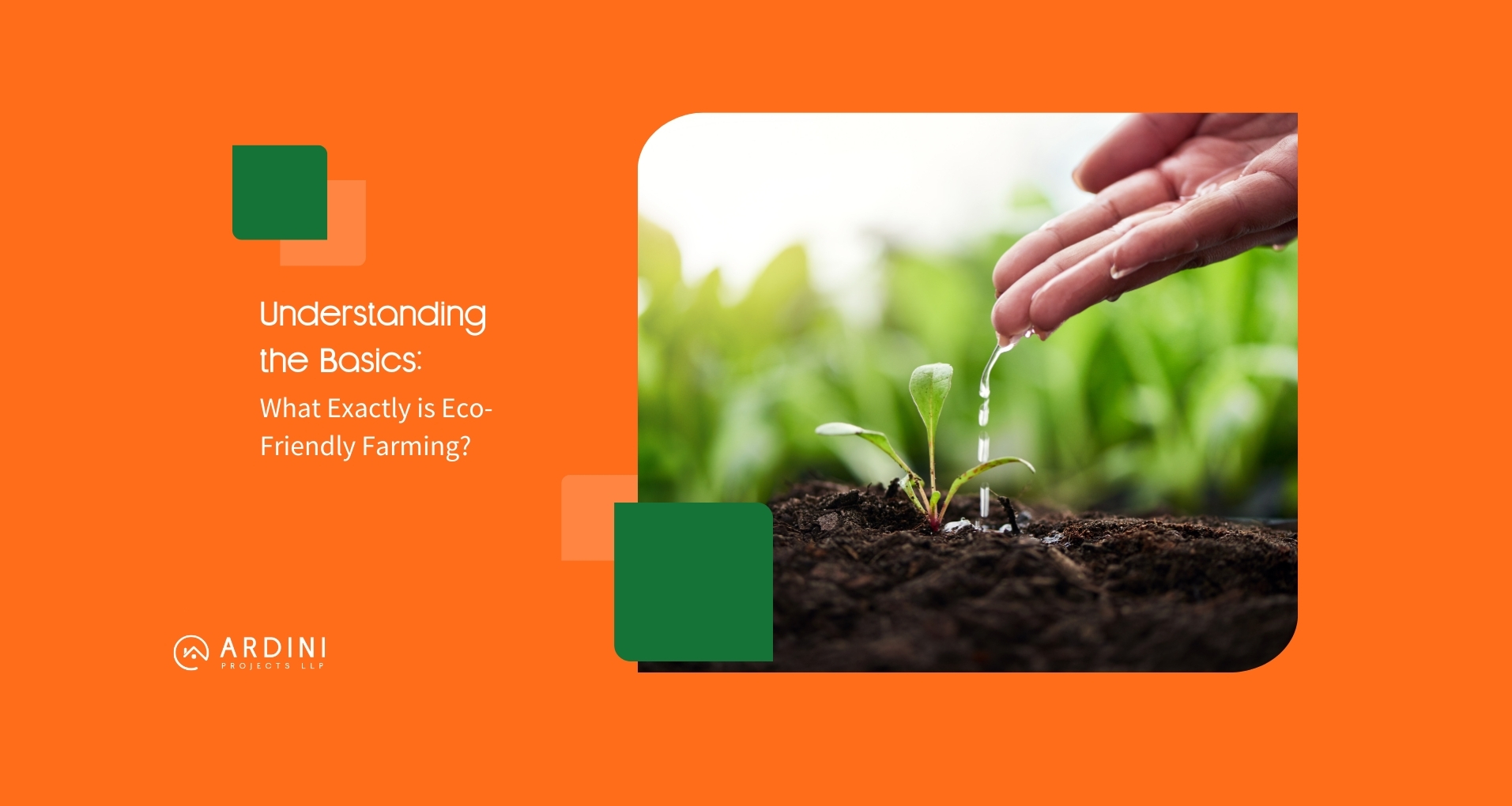Understanding the Basics: What is Eco-Friendly Farming?

In today's world, where environmental consciousness is at an all-time high, eco-friendly farming is taking centre stage. But what exactly does it entail? How is it different from traditional farming methods? This blog dives into the core principles of eco-friendly farming, highlighting its benefits and exploring how communities like Ecowood Habitat by Ardini Projects LLP are embracing these practices.
What is Eco-Friendly Farming?
Eco-friendly farming, also known as sustainable agriculture, is a holistic approach to cultivating crops and raising livestock that prioritizes environmental well-being alongside food production. It focuses on minimizing negative environmental impacts while ensuring the land’s long-term productivity.
Important Principles of Eco-Friendly Farming
- Soil Health: Eco-friendly farming practices nurture healthy soil, the foundation of a thriving ecosystem. Techniques like crop rotation, cover cropping, and minimal tillage promote soil fertility, water retention, and microbial activity.
- Biodiversity Promotion: Creating a diverse habitat with various plants and wildlife is a cornerstone of eco-friendly farming. This fosters natural pest control mechanisms and promotes a healthy balance in the ecosystem. Imagine a farm stay near Bangalore where you can witness this biodiversity firsthand!
- Water Conservation: Preserving this precious resource is vital. Eco-friendly farms utilize drip irrigation and rainwater harvesting techniques to minimize water usage.
- Reduced Reliance on Chemicals: Eco-friendly farming discourages the use of synthetic fertilizers and pesticides. Instead, natural alternatives like compost and organic pest control methods are employed.
Examples of Eco-Friendly Farming Practices
- Organic Farming: This widely recognized practice eliminates synthetic fertilizers and pesticides, promoting healthy soil and organic produce. Ecowood Habitat, for example, focuses on organic cultivation methods, ensuring residents have access to fresh, healthy food.
- Crop Rotation: Planting different crops in sequence helps maintain soil fertility, prevent pest and disease outbreaks, and improve crop yield.
- Composting: Organic waste is transformed into nutrient-rich compost, providing a natural fertilizer that nourishes the soil.
- Agroforestry: Integrating trees and shrubs into farmland provides a habitat for beneficial insects, improves soil quality, and offers additional income opportunities by cultivating trees like the red sandalwood tree (also known as the red chandan tree or sandalwood plant).
The Allure of Eco-Friendly Farming
Eco-friendly farming offers a multitude of benefits, not just for the environment but also for farmers and consumers:
- Environmental Sustainability: By promoting soil health, conserving water, and reducing pollution, eco-friendly farming contributes to a healthier planet.
- Improved Food Quality: Organic produce grown using eco-friendly methods is often considered healthier and more flavorful.
- Economic Benefits: Sustainable practices can enhance long-term farm productivity and profitability. Some eco-friendly practices, like cultivating red sandalwood trees, can generate a lucrative income stream. While the exact red sandalwood tree price can fluctuate, the potential return on investment makes it an attractive option for some farmers.
Investing in a Sustainable Future with Ecowood Habitat
Ecowood Habitat embodies the principles of eco-friendly farming, offering residents the opportunity to:
- Invest in Agricultural Land in India: Participate in a sustainable land management initiative while potentially earning returns on your investment.
- Experience Farm Living: Explore the beauty of farm land near Bangalore, with the option of a farm stay to immerse yourself in nature.
- Contribute to Environmental Conservation: By supporting eco-friendly practices, you contribute to a greener future for generations.
Ecowood Habitat offers a variety of farm plots, ranging from 1 acre agricultural land to larger options, catering to diverse needs and budgets. Additionally, managed farmland services are available, ensuring optimal land management and maximizing your investment’s potential.
Conclusion
Eco-friendly farming is not just a trend; it’s a necessity for a sustainable future. By embracing these practices, we can cultivate a healthier planet, ensure food security for future generations, and create a more harmonious relationship with the natural world. Explore the possibilities of managed farmland at Ecowood Habitat and join the movement towards a greener tomorrow. Remember, every choice we make, from the food we eat to how we cultivate our land, can shape the future. Choose wisely, choose eco-friendly!
- Tags : #ecofriendly #ecohabitat, Invest, Managed Farming, Managed Farmland
